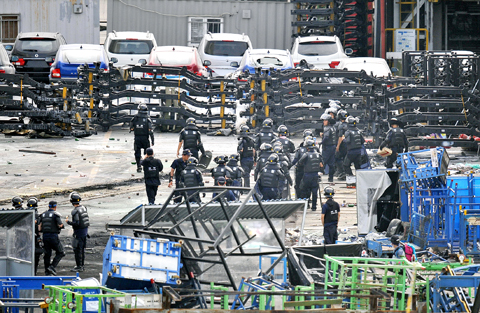A 77-day sit-in by workers battling redundancy, which shut down a South Korean auto plant and sparked violent clashes with police, appeared to be ending yesterday.
Ssangyong Motor said unionists were leaving the paint shop where they had holed up although some hardline members were still inside. Yonhap news agency said workers and management had reached a deal to end the occupation.
Almost 100 people have been injured this week at the plant in Pyeongtaek, 70km south of Seoul. Strikers have battled riot police with giant catapults, firebombs and steel pipes while police fought back with tear gas.

PHOTO: AFP
In dramatic scenes on Wednesday, police commandos rappelled from helicopters onto the roof of the paint shop, the last building still held by the strikers.
Other officers inside three containers lifted by giant cranes landed on a nearby roof on Wednesday while two helicopters dropped liquefied tear gas on protesters. Ssangyong spokesman Cha Ki-ung could not confirm the deal but said there would be an announcement soon about talks which began earlier yesterday.
Cha said unionists were leaving the paint shop.
“Some hardline members are still inside. Other members gave up and are waiting in a building attached to the paint shop for ID checks by police,” the spokesman said.
Yonhap said 30 members who rejected the deal are still inside. It said police plan to arrest 21 alleged ringleaders.
The Chinese-invested Ssangyong, the country’s smallest automaker, received court protection from bankruptcy in exchange for a turnaround plan which called for 36 percent of its workforce, or 2,646 employees, to be sacked.
Some 1,670 accepted voluntary retirement but the rest went on strike and occupied several buildings, eventually halting production.
More than half gave up after managers cut off power and water and thousands of riot police tightened their siege.
An estimated 500 were still holed up in the paint shop earlier Thursday, with police fearful of storming the building because it is packed with inflammable materials.
Union leader Han Sang-kyun and court-appointed manager Park Young-tae began meeting earlier in the day in a container outside the paint shop.
“I understand that both sides reached a deal to save 48 percent of the fired workers,” Yonhap quoted a source as saying.
The union had proposed a plan to save 48 percent of the workers by giving them unpaid long-term leave of absence, the source said. Ssangyong had previously offered to save 40 percent.
The standoff has clouded prospects for the carmaker’s survival, costing nearly 316 billion won (US$258.3 million) in lost production.
China’s Shanghai Automotive Industry Corp has a 51 percent stake in Ssangyong, but lost management control when it received bankruptcy protection.
The firm specializes in sport utility vehicles and luxury sedans.
Surveys show South Korea’s reputation for union militancy has been a factor discouraging foreign investment. But despite the scary scenes at Ssangyong, analysts say employees are generally becoming more pragmatic.
Several unions have recently quit the militant umbrella group the Korean Confederation of Trade Unions, which was involved in the Ssangyong dispute.

Packed crowds in India celebrating their cricket team’s victory ended in a deadly stampede on Wednesday, with 11 mainly young fans crushed to death, the local state’s chief minister said. Joyous cricket fans had come out to celebrate and welcome home their heroes, Royal Challengers Bengaluru, after they beat Punjab Kings in a roller-coaster Indian Premier League (IPL) cricket final on Tuesday night. However, the euphoria of the vast crowds in the southern tech city of Bengaluru ended in disaster, with Indian Prime Minister Narendra calling it “absolutely heartrending.” Karnataka Chief Minister Siddaramaiah said most of the deceased are young, with 11 dead

By 2027, Denmark would relocate its foreign convicts to a prison in Kosovo under a 200-million-euro (US$228.6 million) agreement that has raised concerns among non-governmental organizations (NGOs) and residents, but which could serve as a model for the rest of the EU. The agreement, reached in 2022 and ratified by Kosovar lawmakers last year, provides for the reception of up to 300 foreign prisoners sentenced in Denmark. They must not have been convicted of terrorism or war crimes, or have a mental condition or terminal disease. Once their sentence is completed in Kosovan, they would be deported to their home country. In

Brazil, the world’s largest Roman Catholic country, saw its Catholic population decline further in 2022, while evangelical Christians and those with no religion continued to rise, census data released on Friday by the Brazilian Institute of Geography and Statistics (IBGE) showed. The census indicated that Brazil had 100.2 million Roman Catholics in 2022, accounting for 56.7 percent of the population, down from 65.1 percent or 105.4 million recorded in the 2010 census. Meanwhile, the share of evangelical Christians rose to 26.9 percent last year, up from 21.6 percent in 2010, adding 12 million followers to reach 47.4 million — the highest figure

LOST CONTACT: The mission carried payloads from Japan, the US and Taiwan’s National Central University, including a deep space radiation probe, ispace said Japanese company ispace said its uncrewed moon lander likely crashed onto the moon’s surface during its lunar touchdown attempt yesterday, marking another failure two years after its unsuccessful inaugural mission. Tokyo-based ispace had hoped to join US firms Intuitive Machines and Firefly Aerospace as companies that have accomplished commercial landings amid a global race for the moon, which includes state-run missions from China and India. A successful mission would have made ispace the first company outside the US to achieve a moon landing. Resilience, ispace’s second lunar lander, could not decelerate fast enough as it approached the moon, and the company has